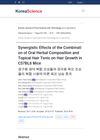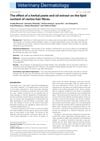 February 2024 in “International journal of biology, pharmacy and allied sciences”
February 2024 in “International journal of biology, pharmacy and allied sciences” Plant-based treatments can effectively and safely treat hair loss.
 24 citations,
January 2015 in “Annals of Dermatology”
24 citations,
January 2015 in “Annals of Dermatology” Herbal extracts may help hair grow and could be an alternative to synthetic hair loss treatments.
 July 2023 in “International journal of pharmacognosy and life science”
July 2023 in “International journal of pharmacognosy and life science” The herbal hair oil made from various plants might be a good alternative to synthetic hair loss treatments.
 10 citations,
March 2019 in “Journal of Dermatological Treatment”
10 citations,
March 2019 in “Journal of Dermatological Treatment” Patients chose Chinese herbal medicine for safety, relapse prevention, and as an alternative to conventional treatments, but found preparation burdensome.

Hair RiseTM microemulsion effectively promotes hair growth and treats hair loss better than standard treatments.
 January 2020 in “Der Pharmacia Lettre”
January 2020 in “Der Pharmacia Lettre” Nanoparticle-based herbal remedies could be promising for treating hair loss with fewer side effects and lower cost, but more research is needed.
23 citations,
February 2021 in “Dermatologic therapy” Some treatments like pentoxifylline with topical corticosteroids might work for alopecia areata, but more research is needed to find the best one.
 5 citations,
January 2019 in “Clinical Drug Investigation”
5 citations,
January 2019 in “Clinical Drug Investigation” Some off-label treatments increase hair density, but long-term safety unknown.
 June 2022 in “Asian Pacific journal of health sciences”
June 2022 in “Asian Pacific journal of health sciences” Ayurvedic treatments like bloodletting, herbal packs, and medicated liquid flow over the head are a safe and effective alternative for hair loss.
 1 citations,
April 2012 in “Korean Journal of Food Science and Technology”
1 citations,
April 2012 in “Korean Journal of Food Science and Technology” Using both oral herbal supplements and hair tonic together works better for hair growth than using just the tonic.
7 citations,
January 2010 in “Research journal of pharmaceutical, biological and chemical sciences” Herbal medicines can be effective alternatives for treating hair loss.
 2 citations,
March 2017 in “Veterinary dermatology”
2 citations,
March 2017 in “Veterinary dermatology” Herbal paste and oil extract might improve dog hair quality by retaining lipids.
 December 2024 in “Deleted Journal”
December 2024 in “Deleted Journal” Herbal hair oils can reduce hair loss and improve scalp health.
 June 2024 in “The Open dermatology journal”
June 2024 in “The Open dermatology journal” The herbal extract is as effective and safe as 3% minoxidil for treating hair loss.
 September 2020 in “Journal of the turkish academy of dermatology”
September 2020 in “Journal of the turkish academy of dermatology” Some dermatology patients in Turkey use traditional medicine, with herbal remedies being most common, but these treatments can have mixed results and risks.
 30 citations,
October 2015 in “Journal of Ethnopharmacology”
30 citations,
October 2015 in “Journal of Ethnopharmacology” Herbal compounds like ricinoleic acid, quercetin-3-O-rutinoside, and hinokiflavone may be safe and effective for treating hair loss.
14 citations,
November 2012 in “SLAS discovery” Some herbal extracts can promote hair growth and prevent hair loss.
 3 citations,
January 2011 in “Journal of biologically active products from nature”
3 citations,
January 2011 in “Journal of biologically active products from nature” The F1 herbal mixture grew hair well and could treat hair loss without the side effects of common treatments.
 March 2024 in “Deleted Journal”
March 2024 in “Deleted Journal” Certain herbal plants can effectively treat PCOS symptoms.

Herbal ingredients in cosmetics are popular for their benefits and fewer side effects.
December 2023 in “International journal of research publications” Herbal medicine and nutraceuticals may help treat Post COVID-19 Syndrome, but more research is needed.

The document concludes that activating hair roots is important for improving hair growth and preventing hair loss.
December 2022 in “International journal of research publications” Herbal medicine might be a good alternative for treating hair loss.
1 citations,
October 2015 in “The Pharma Innovation Journal” The best way to make a topical treatment for hair loss is to mix Saw Palmetto extract with 48% ethanol at the end of making the lotion.
 September 2024 in “Advanced Biomedical Research”
September 2024 in “Advanced Biomedical Research” Auriculotherapy and Aslagh capsules are as effective as metformin for treating PCOS symptoms, with auriculotherapy slightly better for reducing hair growth.
 January 2023 in “Pharma innovation”
January 2023 in “Pharma innovation” Polycystic ovary syndrome affects health and can be hard to diagnose, with treatments ranging from drugs to herbal remedies.
12 citations,
May 2019 in “Journal of cosmetic dermatology” Effective treatments for premature hair graying still require significant research.
 5 citations,
August 2013 in “The Journal of Pediatrics of Korean Medicine”
5 citations,
August 2013 in “The Journal of Pediatrics of Korean Medicine” The treatments helped the girl's hair grow back, but more research is needed for different types of hair loss.
 1 citations,
July 2023 in “Cureus”
1 citations,
July 2023 in “Cureus” Some treatments for hereditary hair loss are effective but vary in results and side effects; new therapies show promise but need more research.
September 2024 in “Journal of Ayurveda and Integrative Medicine” Ayurvedic treatments can improve symptoms and quality of life for systemic sclerosis patients.






















